M.I. Lastman's Blog, page 5
July 9, 2015
Aforementioned: aphorisms and questions for 2015
A worldwide habit of 1 child per fertile woman will be the grand legacy of our generation for those that follow.  Subtracting continued lengthening of life expectancy, a habit of two children per fertile woman would mean a replacement of about 75% of human population per generation. If we had started sooner this would likely have wrought miracles. It's too late. Now we need to make the more draconian sacrifice of one child per family. To judge from the picture above it's not so draconian.
Subtracting continued lengthening of life expectancy, a habit of two children per fertile woman would mean a replacement of about 75% of human population per generation. If we had started sooner this would likely have wrought miracles. It's too late. Now we need to make the more draconian sacrifice of one child per family. To judge from the picture above it's not so draconian.
 Subtracting continued lengthening of life expectancy, a habit of two children per fertile woman would mean a replacement of about 75% of human population per generation. If we had started sooner this would likely have wrought miracles. It's too late. Now we need to make the more draconian sacrifice of one child per family. To judge from the picture above it's not so draconian.
Subtracting continued lengthening of life expectancy, a habit of two children per fertile woman would mean a replacement of about 75% of human population per generation. If we had started sooner this would likely have wrought miracles. It's too late. Now we need to make the more draconian sacrifice of one child per family. To judge from the picture above it's not so draconian.
Published on July 09, 2015 06:37
July 8, 2015
Aforementioned: aphorisms and questions for 2015
The last time the atmosphere warmed almost as fast as today, sea levels rose six metres. These post storm surge pictures show the starting point of that rise. 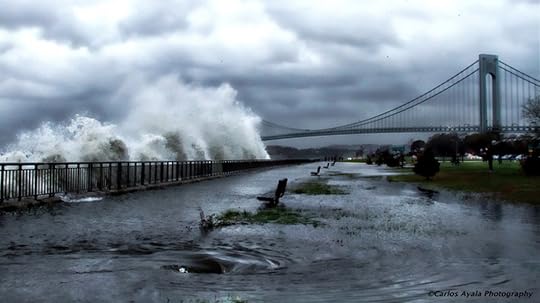


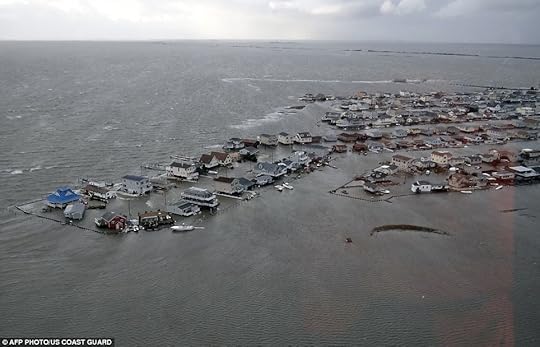 Twenty feet is not far short of the tallest building in the above picture. In the picture above that, the traffic lights would be well under water.
Twenty feet is not far short of the tallest building in the above picture. In the picture above that, the traffic lights would be well under water.



 Twenty feet is not far short of the tallest building in the above picture. In the picture above that, the traffic lights would be well under water.
Twenty feet is not far short of the tallest building in the above picture. In the picture above that, the traffic lights would be well under water.
Published on July 08, 2015 05:54
July 7, 2015
Aforementioned: aphorisms and questions for 2015
Since 1950 seabird pop. down 70%, human pop. up 250% and still we talk of growth.
http://goo.gl/VjpJAK




Published on July 07, 2015 04:26
July 6, 2015
Aforementioned: aphorisms and questions for 2015
So far there are no photos of the Heavenly Kingdom (Queendom?) of God – lots of paintings though. 


 There are billions, maybe trillions, of images around if you are inclined to the view that the Kingdom (Queendom?) of God is on earth.
There are billions, maybe trillions, of images around if you are inclined to the view that the Kingdom (Queendom?) of God is on earth.



 There are billions, maybe trillions, of images around if you are inclined to the view that the Kingdom (Queendom?) of God is on earth.
There are billions, maybe trillions, of images around if you are inclined to the view that the Kingdom (Queendom?) of God is on earth.
Published on July 06, 2015 02:18
July 5, 2015
Aforementioned: aphorisms and questions for 2015
Beware the wishful dreams of metaphysics. Now that we’ve wasted everything here, will God bail us out there?  Given the terribly destructive job we are doing with managing our earthly home, its hard to see how some religious evangelists can be so serenely secure about their imagined heavenly home. Take for example the mission statement of the Christian and Missionary Alliance:
Given the terribly destructive job we are doing with managing our earthly home, its hard to see how some religious evangelists can be so serenely secure about their imagined heavenly home. Take for example the mission statement of the Christian and Missionary Alliance:
Our ultimate goal is to fulfill the Great Commission and bring Matthew 24:14 to fruition:
"And this gospel of the kingdom will be preached in the whole world as a testimony to all nations, and then the end will come."
Stephen Harper, Prime Minister of Canada at the time this blog was written, is a member of the Christian and Missionary Alliance. Perhaps he should ask is "the end,"the end?
 Given the terribly destructive job we are doing with managing our earthly home, its hard to see how some religious evangelists can be so serenely secure about their imagined heavenly home. Take for example the mission statement of the Christian and Missionary Alliance:
Given the terribly destructive job we are doing with managing our earthly home, its hard to see how some religious evangelists can be so serenely secure about their imagined heavenly home. Take for example the mission statement of the Christian and Missionary Alliance:Our ultimate goal is to fulfill the Great Commission and bring Matthew 24:14 to fruition:
"And this gospel of the kingdom will be preached in the whole world as a testimony to all nations, and then the end will come."
Stephen Harper, Prime Minister of Canada at the time this blog was written, is a member of the Christian and Missionary Alliance. Perhaps he should ask is "the end,"the end?
Published on July 05, 2015 01:20
July 4, 2015
Aforementioned: aphorisms and questions for 2015
Does education work? Australia is compromising the Great Barrier Reef; Canada is destroying its boreal and kelp forests.
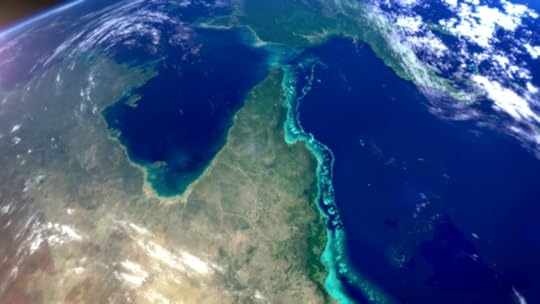
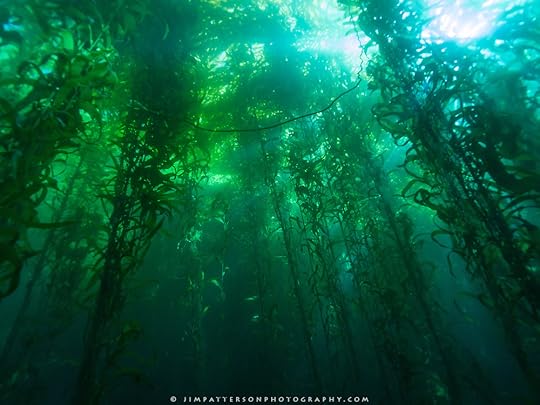

 Australia and Canada are two of the best educated countries in the world, yet their citizens have voted for policies that have led to the results pictured above. It is reasonable therefore to ask, "Is education the panacea for human ills that we have long thought it to be?" It will not be possible to fully argue that point in a paragraph or two, but we need to think deeply about it. On the surface one might argue that the results would be much worse without education. Really, how could they be worse? The ugly truth is that our reductionist, technology-oriented system of education is one of the principal reasons the biosphere is now deteriorating so rapidly. Perhaps we should ask if the Great Barrier Reef would be declared officially endangered by UNESCO if Australia had been following the education system favoured by its aboriginal peoples. Similarly, we should ask if the tar sands would ever have been undertaken if we had followed the "uneducated" advice of its aboriginal peoples.
Australia and Canada are two of the best educated countries in the world, yet their citizens have voted for policies that have led to the results pictured above. It is reasonable therefore to ask, "Is education the panacea for human ills that we have long thought it to be?" It will not be possible to fully argue that point in a paragraph or two, but we need to think deeply about it. On the surface one might argue that the results would be much worse without education. Really, how could they be worse? The ugly truth is that our reductionist, technology-oriented system of education is one of the principal reasons the biosphere is now deteriorating so rapidly. Perhaps we should ask if the Great Barrier Reef would be declared officially endangered by UNESCO if Australia had been following the education system favoured by its aboriginal peoples. Similarly, we should ask if the tar sands would ever have been undertaken if we had followed the "uneducated" advice of its aboriginal peoples.
The kelp forest pictured above is apparently healthy, but a single pass by a bottom trawler would utterly destroy the life of that forest. Some think that kelp forests sequester as much as 75% of the carbon absorbed annually by the oceans worldwide. We urgently need to pay attention to that. The Prime Minister of Canada has declared oceanic research to be unnecessary. Canadians are "well-educated,"but how many even know about the kelp forests along our 15% of world coastlines?



 Australia and Canada are two of the best educated countries in the world, yet their citizens have voted for policies that have led to the results pictured above. It is reasonable therefore to ask, "Is education the panacea for human ills that we have long thought it to be?" It will not be possible to fully argue that point in a paragraph or two, but we need to think deeply about it. On the surface one might argue that the results would be much worse without education. Really, how could they be worse? The ugly truth is that our reductionist, technology-oriented system of education is one of the principal reasons the biosphere is now deteriorating so rapidly. Perhaps we should ask if the Great Barrier Reef would be declared officially endangered by UNESCO if Australia had been following the education system favoured by its aboriginal peoples. Similarly, we should ask if the tar sands would ever have been undertaken if we had followed the "uneducated" advice of its aboriginal peoples.
Australia and Canada are two of the best educated countries in the world, yet their citizens have voted for policies that have led to the results pictured above. It is reasonable therefore to ask, "Is education the panacea for human ills that we have long thought it to be?" It will not be possible to fully argue that point in a paragraph or two, but we need to think deeply about it. On the surface one might argue that the results would be much worse without education. Really, how could they be worse? The ugly truth is that our reductionist, technology-oriented system of education is one of the principal reasons the biosphere is now deteriorating so rapidly. Perhaps we should ask if the Great Barrier Reef would be declared officially endangered by UNESCO if Australia had been following the education system favoured by its aboriginal peoples. Similarly, we should ask if the tar sands would ever have been undertaken if we had followed the "uneducated" advice of its aboriginal peoples.The kelp forest pictured above is apparently healthy, but a single pass by a bottom trawler would utterly destroy the life of that forest. Some think that kelp forests sequester as much as 75% of the carbon absorbed annually by the oceans worldwide. We urgently need to pay attention to that. The Prime Minister of Canada has declared oceanic research to be unnecessary. Canadians are "well-educated,"but how many even know about the kelp forests along our 15% of world coastlines?
Published on July 04, 2015 08:15
July 3, 2015
Aforementioned: aphorisms and questions for 2015
Laudato Si: a hopeful read, but futile if the Pope can not see that it is godly to reduce our population.
http://goo.gl/Q0yVuJ
 In 2013 the Pope spoke to millions of the poor in Brazil. This picture, teeming with humans with screened pictures of the him interspersed, says a great deal. However, idealistic and forward thinking his message may be, there is no hope that it will ever be fulfilled with our numbers ever struggling upwards into more privation for ourselves and for everything else in the biosphere. To make the message of Laudato si truly meaningful, the Pope must take the next step and lead a movement to reduce the human population as quickly as it can be done in a humane and (if you will) godly fashion. Sadly, this is likely impossible for him and he will never see his vision realized.
In 2013 the Pope spoke to millions of the poor in Brazil. This picture, teeming with humans with screened pictures of the him interspersed, says a great deal. However, idealistic and forward thinking his message may be, there is no hope that it will ever be fulfilled with our numbers ever struggling upwards into more privation for ourselves and for everything else in the biosphere. To make the message of Laudato si truly meaningful, the Pope must take the next step and lead a movement to reduce the human population as quickly as it can be done in a humane and (if you will) godly fashion. Sadly, this is likely impossible for him and he will never see his vision realized.
http://goo.gl/Q0yVuJ
 In 2013 the Pope spoke to millions of the poor in Brazil. This picture, teeming with humans with screened pictures of the him interspersed, says a great deal. However, idealistic and forward thinking his message may be, there is no hope that it will ever be fulfilled with our numbers ever struggling upwards into more privation for ourselves and for everything else in the biosphere. To make the message of Laudato si truly meaningful, the Pope must take the next step and lead a movement to reduce the human population as quickly as it can be done in a humane and (if you will) godly fashion. Sadly, this is likely impossible for him and he will never see his vision realized.
In 2013 the Pope spoke to millions of the poor in Brazil. This picture, teeming with humans with screened pictures of the him interspersed, says a great deal. However, idealistic and forward thinking his message may be, there is no hope that it will ever be fulfilled with our numbers ever struggling upwards into more privation for ourselves and for everything else in the biosphere. To make the message of Laudato si truly meaningful, the Pope must take the next step and lead a movement to reduce the human population as quickly as it can be done in a humane and (if you will) godly fashion. Sadly, this is likely impossible for him and he will never see his vision realized.
Published on July 03, 2015 07:27
July 2, 2015
Aforementioned: aphorisms and questions for 2015
The tipping point's past: there's no way to save the biosphere if we can’t restore the natural carbon sinks soon. 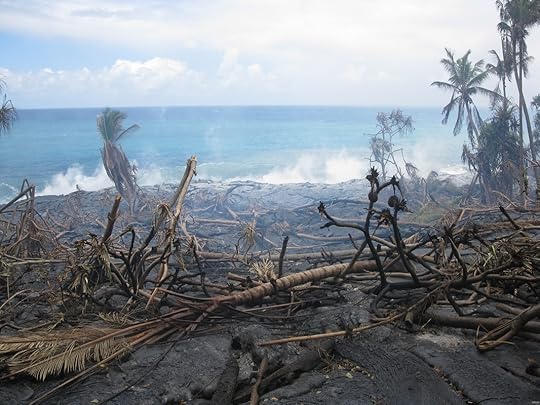 There are many hopeful signs that the world is waking up to the crisis of the biosphere. But they are much too late if we can't restore the carbon sinks that we, homo sapiens, non sapiens have unthinkingly destroyed in our mad rush to grow.
There are many hopeful signs that the world is waking up to the crisis of the biosphere. But they are much too late if we can't restore the carbon sinks that we, homo sapiens, non sapiens have unthinkingly destroyed in our mad rush to grow.
 There are many hopeful signs that the world is waking up to the crisis of the biosphere. But they are much too late if we can't restore the carbon sinks that we, homo sapiens, non sapiens have unthinkingly destroyed in our mad rush to grow.
There are many hopeful signs that the world is waking up to the crisis of the biosphere. But they are much too late if we can't restore the carbon sinks that we, homo sapiens, non sapiens have unthinkingly destroyed in our mad rush to grow.
Published on July 02, 2015 06:29
July 1, 2015
Aforementioned: aphorisms and questions for 2015
The nautilus has survived for ½ billion years, even through the End-Permian Mass Extinction. It won’t survive us.

 These are the shells of survivors that have evolved over those half billion years, but the design for survival was remarkably resilient until we came along. The main problem today is their shells which we covet for our living rooms. This fossil from before the Permian-Triassic Boundary gives some idea of the durability of the type.
These are the shells of survivors that have evolved over those half billion years, but the design for survival was remarkably resilient until we came along. The main problem today is their shells which we covet for our living rooms. This fossil from before the Permian-Triassic Boundary gives some idea of the durability of the type. 

 These are the shells of survivors that have evolved over those half billion years, but the design for survival was remarkably resilient until we came along. The main problem today is their shells which we covet for our living rooms. This fossil from before the Permian-Triassic Boundary gives some idea of the durability of the type.
These are the shells of survivors that have evolved over those half billion years, but the design for survival was remarkably resilient until we came along. The main problem today is their shells which we covet for our living rooms. This fossil from before the Permian-Triassic Boundary gives some idea of the durability of the type. 
Published on July 01, 2015 05:47
June 30, 2015
Aforementioned: aphorisms and questions for 2015
E= mc2 /E= most childrenX, or E=maximum children:2. You choose. 


 There are many ways to take this blog. The issues are not simple. The basic intention, however, is to make the point that we can choose between controlling and reducing our population or continuing to let it grow. Reducing human population promises the most important part of the solution to the crisis of the biosphere, the second, the present norm, promises only more hunger and ultimately destruction of the biosphere.
There are many ways to take this blog. The issues are not simple. The basic intention, however, is to make the point that we can choose between controlling and reducing our population or continuing to let it grow. Reducing human population promises the most important part of the solution to the crisis of the biosphere, the second, the present norm, promises only more hunger and ultimately destruction of the biosphere.
We cannot solve the crisis of the biosphere with technology without simultaneously addressing the tyrannosaurus rex in the room: our huge, plague-mode population.



 There are many ways to take this blog. The issues are not simple. The basic intention, however, is to make the point that we can choose between controlling and reducing our population or continuing to let it grow. Reducing human population promises the most important part of the solution to the crisis of the biosphere, the second, the present norm, promises only more hunger and ultimately destruction of the biosphere.
There are many ways to take this blog. The issues are not simple. The basic intention, however, is to make the point that we can choose between controlling and reducing our population or continuing to let it grow. Reducing human population promises the most important part of the solution to the crisis of the biosphere, the second, the present norm, promises only more hunger and ultimately destruction of the biosphere. We cannot solve the crisis of the biosphere with technology without simultaneously addressing the tyrannosaurus rex in the room: our huge, plague-mode population.
Published on June 30, 2015 07:19



